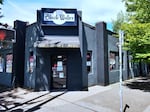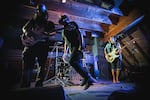Right before Oregon music venues were forced to shutter in March under Gov. Kate Brown’s executive stay-at-home order, Mississippi Studios founder and co-owner Jim Brunberg had to make a tough call.
Brunberg’s close friend, veteran Portland musician Casey Neill, was scheduled to play at the 300-person-capacity venue.
He could have squeezed the show in without breaking the law at the time.
“But it just didn’t feel safe because of the science,” Brunberg said. “It’s not just lip service to say that the safety of our patrons is the most important thing.”
Ultimately, he decided to cancel the show at Mississippi Studios, which remains closed for performances.
“It was heartbreaking for me,” Brunberg admitted. “I love Casey and I know that live performances are a source of income for him.”
“Even though it wasn’t mandated then, a lot of other [Oregon venues] made similar decisions and canceled their shows,” he recalled. “We didn’t want to be the news story three weeks later — like, ‘Look, all these people who came to this show and got sick.’”

Casey Neill & the Norway Rats - opbmusic session at Kelly's Olympian
opbmusic
Brunberg’s predicament — squaring public health precaution with business interests and a commitment to the arts — said a lot about the nature of Portland’s live music ecosystem. Portland is famous for its wealth of independent venues of varying sizes; there are no corporate operators and even top brass players are deeply embedded in the local arts scene.
But that once-thriving ecosystem is in serious jeopardy, and the trickle-down effects from venue closures like Mississippi Studios could be disastrous for artists and the larger local economy.
“Venues are essential to the recovery of the state and of the country. Without these places downtown, tumbleweeds start rolling through,” warned Brunberg.
Banding together
Brunberg is one of the spokespeople for the Independent Venue Coalition of Oregon. The group, comprising of over 100 independently operated music venues with business models dedicated to ticketed events, is collectively lobbying for direct financial assistance from Oregon’s share of the federal Coronavirus Relief Fund.
There are three expenses that IVC said are essential to keep venues alive.
“So the biggest one is rent,” Brunberg said. “And then essential payroll and then, third, utilities.”
While he lauded the Small Business Administration’s Paycheck Protection Program, Brunberg pointed out that its low-interest loans only cover those expenses for two months.
Related: Why The Small Business Rescue Program Has Slowed Way Down
“It should do some good for Phase 1 businesses,” he said. “But we’re not a Phase 1 or Phase 2 — we may not even be a Phase 3 business. We’re a phase nothing right now.”
According to Brunberg, capacity reductions, which have been floated as the first step toward many businesses reopening in the coming months, are not viable for most large and medium-sized rooms like Mississippi Studios.
“Venues are just like any other business in that they’re looking for a profit margin that is in that 5-to-10% range,” he explained.
After paying artist appearance guarantees and marketing a show, most music venues still don’t hit that sweet spot with income from tickets. Many rely on extra revenue from things like alcohol sales and private rentals.

Edna Vazquez plays an opbmusic Stagepass concert at Mississippi Studios in Portland, Ore., on Jan. 23, 2015.
opbmusic
“You’re not looking at making money on shows,” explained Brunberg. “You’re looking at making money on good will, concessions and future experiences. That’s kind of how it works.”
But now — with fewer guests?
“The margins are just too low,” he said, a point echoed by other promoters and venue owners with whom opbmusic spoke.
Brunberg said it is simply impossible to be profitable when you pay big venue rent and pay staff to maintain a big venue but essentially make small venue revenue.
“All the same expenses still apply,” he said.
Safety concerns persist
Overhead aside, there’s a deeper source of uncertainty bothering venue owners. Even if theaters and concert halls could reopen tomorrow, would anyone want to go?
“I wouldn’t feel comfortable going to any sort of large venue, and honestly probably not even a mid-sized venue, even if they operate at half capacity which is probably impossible for them to pay staff,” said Aaron Colter of Banana Stand Media.
Related: An Eastern Oregon Restaurant Reopens To Fewer, Hesitant Diners
Colter co-founded Banana Stand in 2007. Since then, the homespun media organization has released over 80 live records and hosted more than 100 shows in Portland. They’ve built a brand off of documenting and facilitating live, local music, but not even Colter thinks the city is ready for concerts to resume anytime soon.
Something as basic as the logistics of safely using the restroom at a show gives him pause.
“That is a high-contact, small, enclosed space where people are spraying all sorts of fluids around,” he said. “Are there really any venues in town that can accommodate that?”
Smaller venues think outside the box
The threat facing Oregon’s small venues, places with a capacity of less than 100, is no less worrisome. Losing them could also potentially devastate local music scenes, where upstart bands cut their teeth before playing at venues like Mississippi Studios.

NE Portland's Black Water Bar is a linchpin of the city’s punk and DIY scenes.
Keith Testerman
Eastside haunt Black Water Bar is one of Portland's last remaining all-ages music venues and a linchpin of the city’s punk and DIY scenes. It's a tiny bar, but according to Alex Carrocio, the venue's front of house manager and promoter, its small size offers an advantage.
“Our overhead costs are always going to be a lot lower than a large venue,” said Carroccio.
Related: Oregon Movie Theaters Struggle For Survival
Black Water is also in the fortunate position of being able to offset its expenses through takeout and delivery business from its attached restaurant. While food orders might help some small performance spaces tread water, they’re far from a long-term financial solution. Carroccio has been brainstorming with employees for ways to reopen safely and solvently.
She hopes that the Oregon Liquor Control Commission will lighten their restrictions on what types of alcoholic beverages can be delivered.
“Even if it was just a little bit,” she said, “it could really give a boost to the people that are really starting to sit in the bottom of their savings.”
Meanwhile, across town at the small punk venue No Fun, promoter Nick Swartz suggests that the industry's future might hinge on the generosity of attendees willing to pay slightly more and touring artists willing to play for less.
“I don't know if those acts are going to lower their rates because the whole point is to fill the space at a reasonable cost of ticket to whoever's attending,” he said.
Locally sourced
According to Nick Swartz, the one silver lining here could be the increased valuation of local talent in Portland because of the potential dangers associated with touring musicians.
“There’s also maybe an inherent danger in having larger acts come through your venue because they’re bouncing around to different rooms in different cities [while on tour]," he said. “Having those people out on a stage essentially spitting by singing onto an audience could create a more dangerous environment. So maybe there will be a hesitancy towards that,” explained Swartz. “Whereas booking the local act that you're pretty sure has not left Portland and has been quarantined for the last couple months would be a more reasonable option.”

Portland band Nasalrod performing at Rontoms on July 7, 2019. Banana Stand Media recorded and organized the show.
Michael Reiersgaard
Mississippi Studios’ Jim Brunberg makes a similar point: Once we do reach a state of relative normalcy, venues of all sizes may prioritize booking local musicians like his friend Casey Neill for a while.
“I think it's good for local music,” Brunberg predicted. “Once we're open, there's going to be a moral imperative to give more local acts prominent shows. And I think the public feels the same way.”